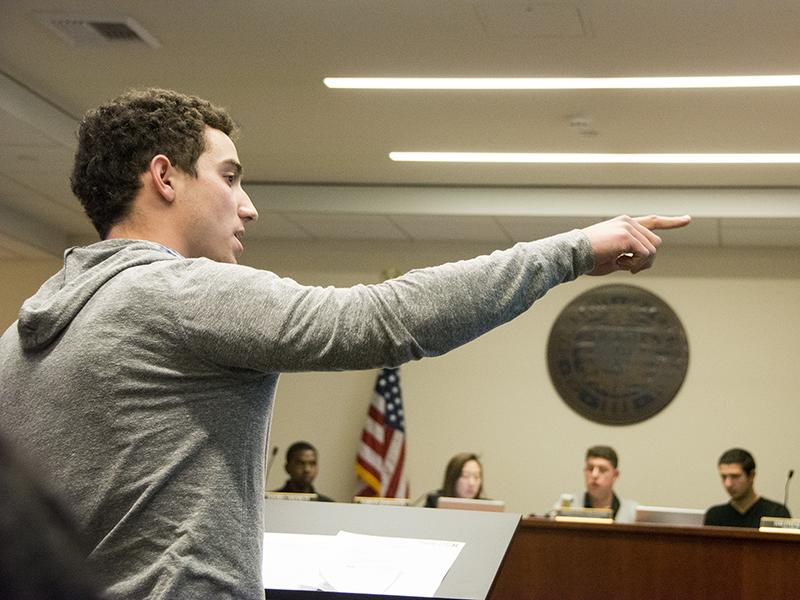
During the special report portion of last Wednesday’s ASUCR senate meeting, a student representative gave a 15-minute presentation questioning the justice of a student-led divestment campaign that calls for the UC administration to cut off business partnerships with any company that allegedly supports apartheid in Israel. The presentation provoked contentious viewpoints among senators as well as members of the public, including one faculty member and a student representative from Students for Justice in Palestine.
Ben Morag, president of Highlanders for Israel (HIFI), expressed that he felt offended by the Boycott, Divestment and Sanction (BDS) movement, criticizing the idea of divestment as exclusionary and unsupportive of the UC spirit. On justifying the Israeli government’s motive in setting up a separation wall between Israel and West Bank, Morag claimed the separation is not due to any discriminative racial reasons, but rather, for the safety of the Israelis.
“Before Israel became a state, people in that area (were) being slaughtered just because they are Jewish … Constantly, through our existence, there have been wars from all the neighboring countries around us. Between the period of 2000 and 2005, (there were) over 147 different suicide bombings, and 71 percent of the dead and wounded are civilians. When this happens to your people, you have to defend yourself and you have to have some separation.”
In addition, Morag claimed that in the Gaza strip, Palestinians named soccer tournaments and schools after people who carried out terrorist attacks, which he claims are intolerable to the Jewish people.
Pointing out that a large pool of diverse minority populations exist in the state of Israel, Morag claimed that Israel has policies “similar to the policy of affirmative action in the United States.” Morag called Israel “a model for democracy in the world” and refuted claims made against the separation of Israeli citizens and Palestinian citizens in Israel.
“Muslims, South African descendents, Jews, European descendents — they all live together, they all coexist (in Israel),” stated Morag. “(Calling) Israel as an apartheid state is not only a slander, but also degrading and insulting to people who actually suffered under apartheid.”
In his conclusion, Morag stated that the divestment campaign is not a peaceable solution in regard to removing the separation wall.
Calling the presentation “pink- and brown-washing,” senator Shadi Matar criticized the presentation’s inclusion of Israel as a pro-LGBT and pro-immigrant country as a diversion from Israel’s alleged abuse of human rights.
Amal Ali, president of Students for Justice in Palestine (SJP), stated, “Palestinians should speak for Palestinians. Other students cannot tell Palestinians what is best for them and for their movement, so keep that in mind when someone tells you what is justice, what is going to bring peace, and what is going to bring self-determination.”
English professor and United States Student Association (ASA) member Fred Moten was also critical of the presentation, calling the claims embedded in the presentation “slanderous and malicious.”
“I want to offer a pledge as the new faculty member here, that I will do everything I can to foster intelligent and critical conversation,” said Moten. “If you believe that Jews have a right to return to what they called their ‘initial homeland,’ yet you deny the right of return to people removed from that homeland … how can there be racial (justice)?”
However, Senator Sean Fahmian expressed doubts regarding the neutrality of the “educational conversation” that Moten pledged to foster, as he pointed out that Moten had already taken the side of opposing Israeli academic institutions when the USSA voted to boycott Israeli academic institutions.
“A lot of times, as seen in this conflict especially, one person will give a side, and the other will refute it,” said Fahmian. “Where the true fact lies, in my opinion, is hard to find. Now, when there are two sides refuting the same thing, where does that leave us, (the senators)? That leaves us to choosing a side.”
Senators Fahmian and Matar both cautioned other senators to take all the information that they absorbed with a grain of salt, and from taking sides too hastily, as “two weeks of research” is not enough to fully comprehend the full scale of this controversy.
For senators to better understand and represent the voices of students that they represent, Vice President of External Affairs Kareem Aref motioned to put a poll on the ASUCR website to get the students’ pulse concerning the conflict.
“I think it’s especially important that when we talk about representing the students, we need to know what the students feel,” said Aref.
Aref would discuss further details concerning setting up the poll on the ASUCR website with Marketing and Promotions Director Ravin Rathod.
Highlights
-
President Sai Patadia announced that ASUCR will be working with student groups such as Providing Opportunities, Dreams and Education in Riverside (PODER) to distribute the $512,000 UCR received for undocumented students.
-
Elections Director Chris Sanchez stated that the elections committee plans to release its issues survey to the campus population next week.
-
ASUCR announced that the Bears’ Den, a meeting place and resource center for clubs, will open on Thursday, Jan. 23.
-
Vice President of External Affairs Kareem Aref delivered a report on UCSA’s budget, and senators voted to approve it.








